revision of unit 11
文档属性
| 名称 | revision of unit 11 | 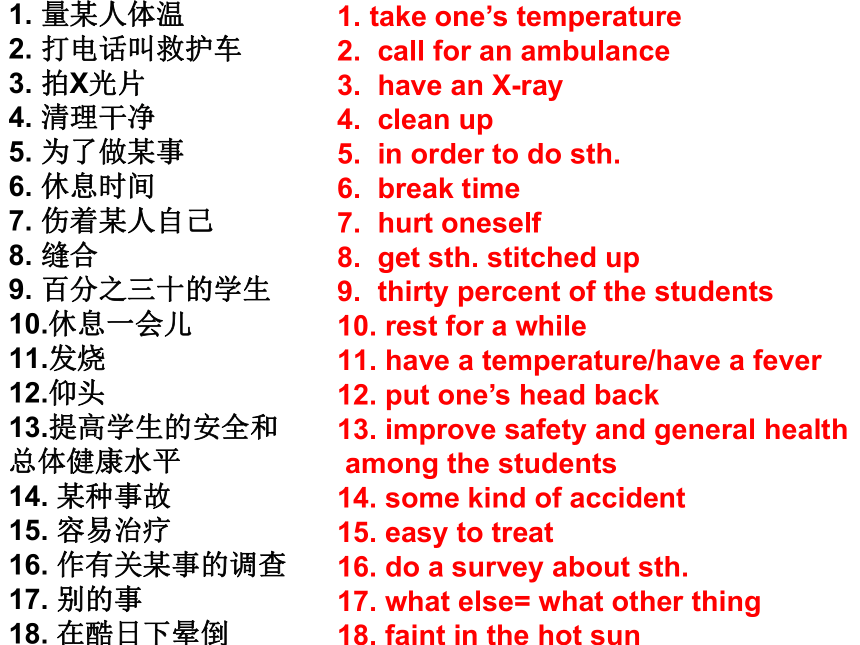 | |
| 格式 | rar | ||
| 文件大小 | 131.6KB | ||
| 资源类型 | 教案 | ||
| 版本资源 | 鲁教版(五四学制) | ||
| 科目 | 英语 | ||
| 更新时间 | 2011-09-18 08:25:17 | ||
图片预览

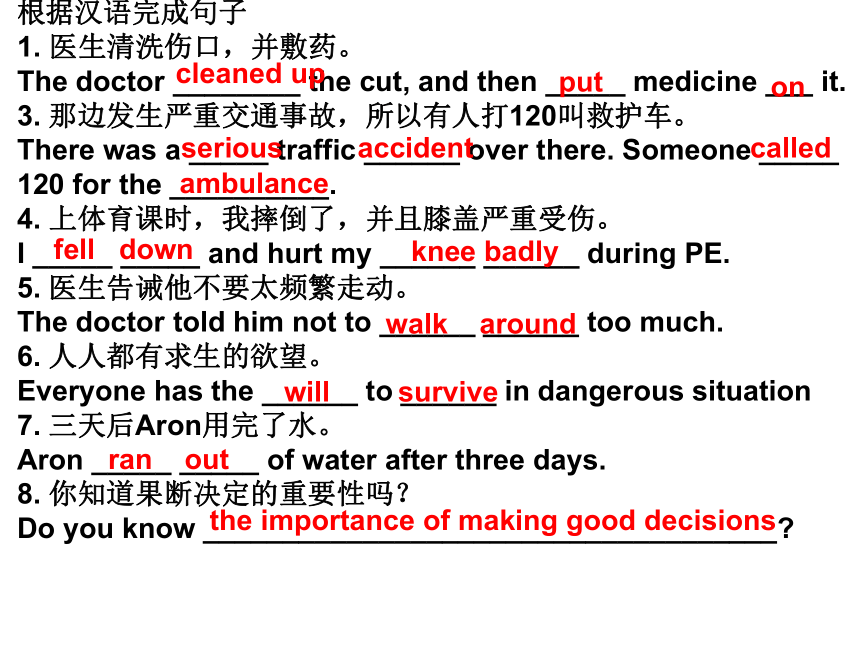
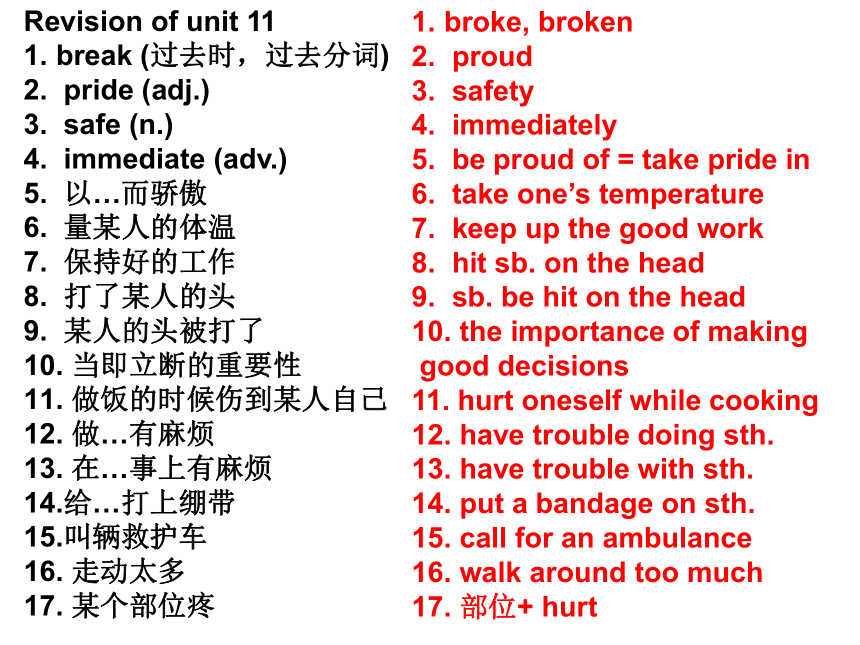
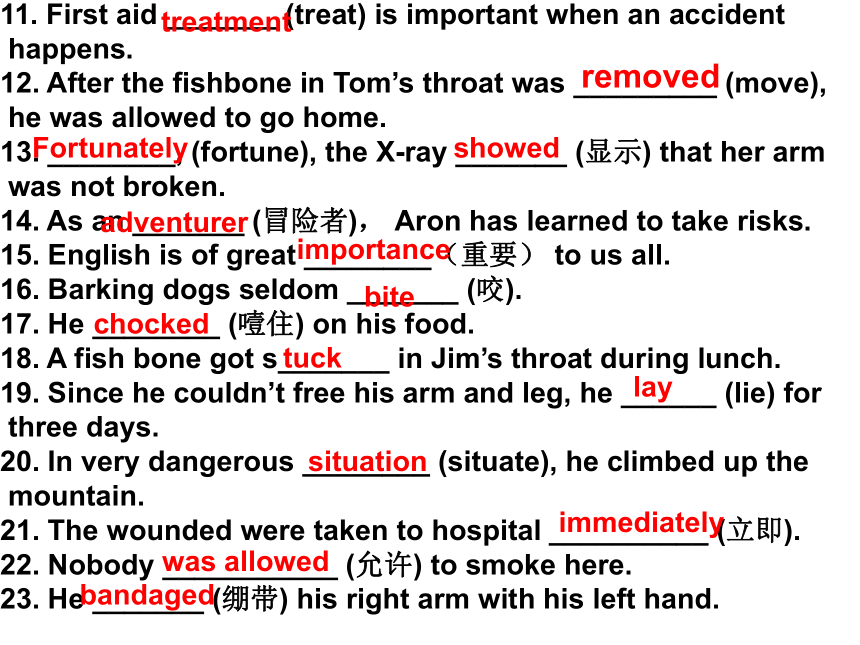
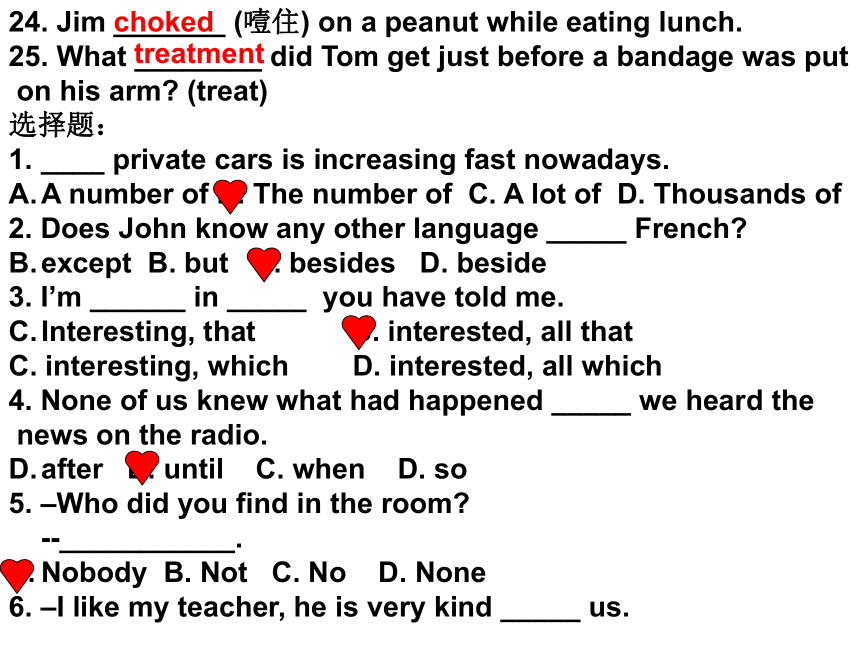
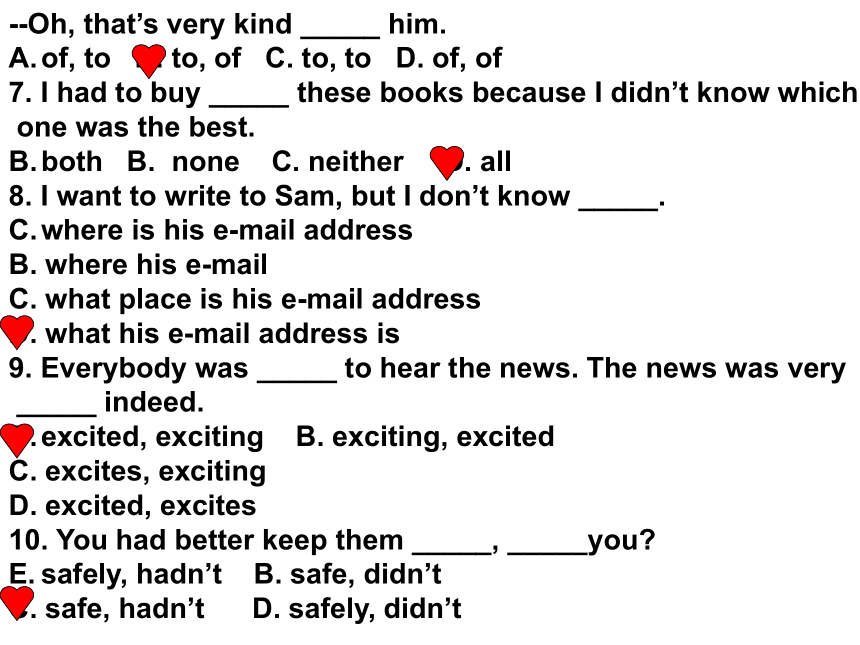
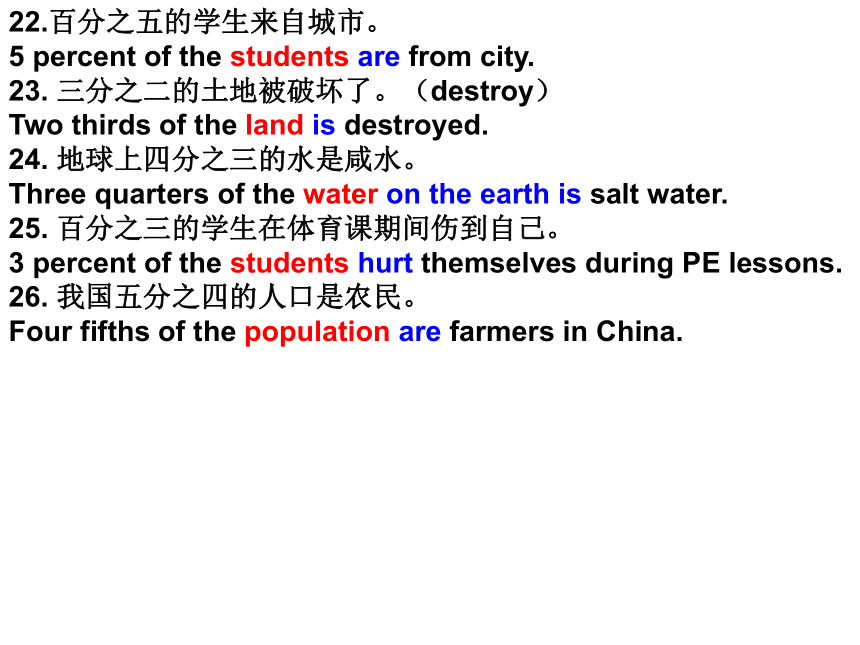
文档简介
(共17张PPT)
量某人体温
打电话叫救护车
拍X光片
清理干净
为了做某事
休息时间
伤着某人自己
缝合
百分之三十的学生
休息一会儿
发烧
仰头
提高学生的安全和
总体健康水平
14. 某种事故
15. 容易治疗
16. 作有关某事的调查
17. 别的事
18. 在酷日下晕倒
take one’s temperature
call for an ambulance
have an X-ray
clean up
in order to do sth.
break time
hurt oneself
get sth. stitched up
thirty percent of the students
rest for a while
have a temperature/have a fever
put one’s head back
improve safety and general health
among the students
14. some kind of accident
15. easy to treat
16. do a survey about sth.
17. what else= what other thing
18. faint in the hot sun
根据汉语完成句子
医生清洗伤口,并敷药。
The doctor ________ the cut, and then _____ medicine ___ it.
3. 那边发生严重交通事故,所以有人打120叫救护车。
There was a _____ traffic ______ over there. Someone _____
120 for the __________.
4. 上体育课时,我摔倒了,并且膝盖严重受伤。
I _____ _____ and hurt my ______ ______ during PE.
5. 医生告诫他不要太频繁走动。
The doctor told him not to ______ ______ too much.
6. 人人都有求生的欲望。
Everyone has the ______ to ______ in dangerous situation
7. 三天后Aron用完了水。
Aron _____ _____ of water after three days.
8. 你知道果断决定的重要性吗?
Do you know ____________________________________
cleaned up
put
on
serious
accident
called
ambulance
fell down
knee badly
walk around
will
survive
ran out
the importance of making good decisions
Revision of unit 11
break (过去时,过去分词)
pride (adj.)
safe (n.)
immediate (adv.)
以…而骄傲
量某人的体温
保持好的工作
打了某人的头
某人的头被打了
当即立断的重要性
做饭的时候伤到某人自己
做…有麻烦
在…事上有麻烦
给…打上绷带
叫辆救护车
走动太多
某个部位疼
broke, broken
proud
safety
immediately
be proud of = take pride in
take one’s temperature
keep up the good work
hit sb. on the head
sb. be hit on the head
the importance of making
good decisions
11. hurt oneself while cooking
12. have trouble doing sth.
13. have trouble with sth.
14. put a bandage on sth.
15. call for an ambulance
16. walk around too much
17. 部位+ hurt
11. First aid _______ (treat) is important when an accident
happens.
12. After the fishbone in Tom’s throat was _________ (move),
he was allowed to go home.
13. ________, (fortune), the X-ray _______ (显示) that her arm
was not broken.
14. As an _______ (冒险者), Aron has learned to take risks.
15. English is of great ________(重要) to us all.
16. Barking dogs seldom _______ (咬).
17. He ________ (噎住) on his food.
18. A fish bone got s_______ in Jim’s throat during lunch.
19. Since he couldn’t free his arm and leg, he ______ (lie) for
three days.
20. In very dangerous ________ (situate), he climbed up the
mountain.
21. The wounded were taken to hospital __________ (立即).
22. Nobody ___________ (允许) to smoke here.
23. He _______ (绷带) his right arm with his left hand.
treatment
removed
Fortunately
showed
adventurer
importance
bite
chocked
tuck
lay
situation
immediately
was allowed
bandaged
24. Jim _______ (噎住) on a peanut while eating lunch.
25. What ________ did Tom get just before a bandage was put
on his arm (treat)
选择题:
____ private cars is increasing fast nowadays.
A number of B. The number of C. A lot of D. Thousands of
2. Does John know any other language _____ French
except B. but C. besides D. beside
3. I’m ______ in _____ you have told me.
Interesting, that B. interested, all that
C. interesting, which D. interested, all which
4. None of us knew what had happened _____ we heard the
news on the radio.
after B. until C. when D. so
5. –Who did you find in the room
--___________.
Nobody B. Not C. No D. None
6. –I like my teacher, he is very kind _____ us.
choked
treatment
--Oh, that’s very kind _____ him.
of, to B. to, of C. to, to D. of, of
7. I had to buy _____ these books because I didn’t know which
one was the best.
both B. none C. neither D. all
8. I want to write to Sam, but I don’t know _____.
where is his e-mail address
B. where his e-mail
C. what place is his e-mail address
D. what his e-mail address is
9. Everybody was _____ to hear the news. The news was very
_____ indeed.
excited, exciting B. exciting, excited
C. excites, exciting
D. excited, excites
10. You had better keep them _____, _____you
safely, hadn’t B. safe, didn’t
C. safe, hadn’t D. safely, didn’t
22.百分之五的学生来自城市。
5 percent of the students are from city.
23. 三分之二的土地被破坏了。(destroy)
Two thirds of the land is destroyed.
24. 地球上四分之三的水是咸水。
Three quarters of the water on the earth is salt water.
25. 百分之三的学生在体育课期间伤到自己。
3 percent of the students hurt themselves during PE lessons.
26. 我国五分之四的人口是农民。
Four fifths of the population are farmers in China.
Language points:
伤到某人的膝盖
cut one’s knee
2. 清理干净
clean up
3. 给..敷上药
put medicine on it
4. 后来他穿着一条干净的裤子从诊所回到班级。
Later he went back to class with a clean pair of trousers from
the clinic.
5. 王苗因花生噎着了。
Wang Miao choked on a peanut.
choke on 因..而噎着/窒息于…
6. 当她吃午饭的时候发生了这件事。
She was eating her lunch when it happened.
It happened while she was eating her lunch.
当一件事情正在进行,另一件事情发生了, 进行的动作可用while
引导从句。如果用when的时候主句用进行时。
当我进门的时候他们在吃饭。
I went in while they were eating.=
They were eating when I went in.
9. 花生被医生安全的拿出来了。
The peanut was safely removed by the doctor.
10. 二十分钟后,她妈妈赶到了学校。
Her mother _____ _____ the school ______ ______ ______.
11. 王苗被带回家休息。
Wang Miao was taken home to rest.
我的书被带到学校去。
My book was taken to school.
12. 一个鱼刺在江明吃午饭期间卡在喉咙里。
A fishbone got stuck in Jia Ming’s throat during lunch.
stick, stuck, stuck 刺,戳
13. 他被立即送往医院在那里他做了个X光片。
He was taken to hospital immediately where he had an X-ray.
14. 在一个危险的位置
in a dangerous situation
15. 立即取出它来很重要。
It’s important to remove it quickly.
arrived at
twenty minutes later
16. 允许某人做某事
allow sb. to do sth.= sb. be allowed to do sth.
不应该允许青少年上网聊天。
Teenagers shouldn’t be allowed to chat on the Internet.
17. 止疼药
some medicine for the pain
18. tell sb. (not) to do sth.
After the accident, he was told _____ PE _____ six weeks.
to do; for B. not to do; for C. doing; at D. not doing; at
Revision:
–Why can’t you do PE today
--I have ______ (break) my arm.
2. I have an allergy and today I’m having trouble ______ (breath)
3. Tom _____ (hit) by a ball yesterday.
4. She ________ (bite) by a dog yesterday.
5. I ________ (be) in this school since 1998.
6. The aim was _____ (find) out about accidents.
7. It is very dangerous here. Carry the baby to ______ (safe).
8. Only 3% of the students hurt _________ (them) during PE
lessons.
9. A survey ______ (do) last month on the students in our
school.
10. I _____________ (finish) my homework and we can go
swimming now.
11. The plane landed on the airport ______ (safe).
12. Who did ______ (bad) in the long jump, Li Lei or Li Ming
13. Yao Ming is a ______ (proud) of us Chinese.
broken
breathing
was hit
was bitten
have been
to find
safety
themselves
was done
have finished
safely
worse
pride
Revision:
他注意到一个小偷溜进了房间。
Helen had to shout _____ about the sound of the music.
Making herself hear B. to make herself hear的
C. Making herself heard D. to make herself heard
3. We found the door ______(lock).
4. We saw the thief ______ (catch) by the policeman.
5. The speaker _____ (提高) his voice but still couldn’t make
himself ______. (hear)
6. She had her house _______.(repair)
7. We must have the work ______ (finish).
8. 当我看见她的时候他正在睡觉。
9. 在过去的一年中,他变化很大。
B
locked
caught
raised
heard
repaired
finished
He was sleeping when I saw him.
While he was sleeping I saw him.
He has changed a lot in the past one year.
He noticed a thief slid into the room.
Read the first two paragraphs and translate them.
Language points
1.
find (found)
it + adj. to do sth.
it is +adj. to do sth.
sth./sb. + done
sth./sb. + doing
我发现努力学习英语很重要。
我发现她躺在床上。
人们发现一个婴儿放在路边。
2. 当Aron Ralston爬山时, 发现他自己处在非常危险的处境。
Aron Ralston found ______ in a very dangerous situation
while _______ .
_____ _____ ________.
I found it was important to learn English.
I found her lying on the bed.
People found a baby put on the road.
himself
climbing
he was climbing
3. 一个27岁的对爬山有着浓厚兴趣的美国人那天不想死去。
Aron —— a ______________ American ______ a deep interest
in ________ ________ —— was not ready to die that day.
4. 切掉,砍掉
cut off
5. Aron 的胳膊被困在一个两千公斤的巨石下
Aron’s arm became trapped under a 2,000-kilo rock.
6. 因为他不能随意活动他的胳膊,他躺了五天希望被人发现。
Since he couldn’t free his arm, he _____ for five days and
hoped to ____________.
lie 当 “位于”讲时
Taiwan _______ the southeast of China and it lies to the south
of Fujian.
Hunan lies on the south of Hubei.
lie “躺”讲 时(lie, lay, lain, lying)
I found a book ______ (lie) on the ground.
He _____(lie) on the bed, ______ (read).
Iie “撒谎”讲时,(lie, lied, lied, lying)
lie to sb. = tell a lie to sb.
lies in
lying
lay
reading
27- year-old
with
mountain climbing
lay
be found
7. 用光,耗尽 (无被动)
sb. run out of sth. = sth. run out (run, ran, ran)
他用光了他的水。
He ran out of water. = His water ran out.
他的耐心将尽。
He is running out of his patience.= His patience is running out.
8. 用他的左臂,他给自己包扎组织流血。
With his left arm, he bandaged himself to stop the bleeding.
with + 名词 表示伴随,“有着,带着”
那个戴红色帽子的男孩是我的弟弟。
The boy with a red hat is my brother.
Read the rest two paragraphs and then translate them.
作为一个冒险者
as a adventure
2. 冒险: take a risk take risks
3. 把某物从…挖出来 dig sth. out of sth. (dig, dug, dug 挖)
4. 求生的欲望: the will to survive
挣钱的欲望: the will to make money
表示目的
will 名词,
愿望,理想
他求生的欲望再一次挽救了他。
His will to survive saved him again.
5. 1) 教给某人某物: (teach, taught, taught)
teacher sb. sth. (sb. 如果是人称代词是必须为宾格)
他教我们英语。
He teaches us English.
2) 教某人做某事:
teach sb. to do sth.
老师教会我们努力学习。
The teachers taught us to study hard.
3) teach sb. + how to do sth. “教某人如何做某事”
父母叫我们如何做人。
Parents teach us how to be a person.
他丢了胳膊之后,写了一本书叫做 《进退两难的境地》。
After losing his arm, he wrote a book called “Between a Rock
and Hard Place”
7. 处于无路可走的境地
in a situation with no escape
8. 当即立断的重要性 the importance of making good decisions.
control “控制,掌控” 名词/动词
对…的控制力 be in control of
检查:
Can you ______ Chinese Please ______ it in Chinese
say; speak B. speak; say C. say; say D. speak; speak
2. There is ______ eating grass on the hill.
so little sheep B. such little sheep
C. such a little sheep D. so a little sheep
3. The doctor _____ some rice. He couldn’t breathe. It’s very
dangerous.
got stuck B. chocked C. chocked on D. got stuck in
4. His will ___ survive always saved him when he was in ____.
of; danger B. of; dangerous C. to; danger D. to; dangerous
5. Again and again, the doctor _____ the boy, but he couldn’t
find out what was wrong with him.
A. looked over B. looked after C. looked for D. looked up
量某人体温
打电话叫救护车
拍X光片
清理干净
为了做某事
休息时间
伤着某人自己
缝合
百分之三十的学生
休息一会儿
发烧
仰头
提高学生的安全和
总体健康水平
14. 某种事故
15. 容易治疗
16. 作有关某事的调查
17. 别的事
18. 在酷日下晕倒
take one’s temperature
call for an ambulance
have an X-ray
clean up
in order to do sth.
break time
hurt oneself
get sth. stitched up
thirty percent of the students
rest for a while
have a temperature/have a fever
put one’s head back
improve safety and general health
among the students
14. some kind of accident
15. easy to treat
16. do a survey about sth.
17. what else= what other thing
18. faint in the hot sun
根据汉语完成句子
医生清洗伤口,并敷药。
The doctor ________ the cut, and then _____ medicine ___ it.
3. 那边发生严重交通事故,所以有人打120叫救护车。
There was a _____ traffic ______ over there. Someone _____
120 for the __________.
4. 上体育课时,我摔倒了,并且膝盖严重受伤。
I _____ _____ and hurt my ______ ______ during PE.
5. 医生告诫他不要太频繁走动。
The doctor told him not to ______ ______ too much.
6. 人人都有求生的欲望。
Everyone has the ______ to ______ in dangerous situation
7. 三天后Aron用完了水。
Aron _____ _____ of water after three days.
8. 你知道果断决定的重要性吗?
Do you know ____________________________________
cleaned up
put
on
serious
accident
called
ambulance
fell down
knee badly
walk around
will
survive
ran out
the importance of making good decisions
Revision of unit 11
break (过去时,过去分词)
pride (adj.)
safe (n.)
immediate (adv.)
以…而骄傲
量某人的体温
保持好的工作
打了某人的头
某人的头被打了
当即立断的重要性
做饭的时候伤到某人自己
做…有麻烦
在…事上有麻烦
给…打上绷带
叫辆救护车
走动太多
某个部位疼
broke, broken
proud
safety
immediately
be proud of = take pride in
take one’s temperature
keep up the good work
hit sb. on the head
sb. be hit on the head
the importance of making
good decisions
11. hurt oneself while cooking
12. have trouble doing sth.
13. have trouble with sth.
14. put a bandage on sth.
15. call for an ambulance
16. walk around too much
17. 部位+ hurt
11. First aid _______ (treat) is important when an accident
happens.
12. After the fishbone in Tom’s throat was _________ (move),
he was allowed to go home.
13. ________, (fortune), the X-ray _______ (显示) that her arm
was not broken.
14. As an _______ (冒险者), Aron has learned to take risks.
15. English is of great ________(重要) to us all.
16. Barking dogs seldom _______ (咬).
17. He ________ (噎住) on his food.
18. A fish bone got s_______ in Jim’s throat during lunch.
19. Since he couldn’t free his arm and leg, he ______ (lie) for
three days.
20. In very dangerous ________ (situate), he climbed up the
mountain.
21. The wounded were taken to hospital __________ (立即).
22. Nobody ___________ (允许) to smoke here.
23. He _______ (绷带) his right arm with his left hand.
treatment
removed
Fortunately
showed
adventurer
importance
bite
chocked
tuck
lay
situation
immediately
was allowed
bandaged
24. Jim _______ (噎住) on a peanut while eating lunch.
25. What ________ did Tom get just before a bandage was put
on his arm (treat)
选择题:
____ private cars is increasing fast nowadays.
A number of B. The number of C. A lot of D. Thousands of
2. Does John know any other language _____ French
except B. but C. besides D. beside
3. I’m ______ in _____ you have told me.
Interesting, that B. interested, all that
C. interesting, which D. interested, all which
4. None of us knew what had happened _____ we heard the
news on the radio.
after B. until C. when D. so
5. –Who did you find in the room
--___________.
Nobody B. Not C. No D. None
6. –I like my teacher, he is very kind _____ us.
choked
treatment
--Oh, that’s very kind _____ him.
of, to B. to, of C. to, to D. of, of
7. I had to buy _____ these books because I didn’t know which
one was the best.
both B. none C. neither D. all
8. I want to write to Sam, but I don’t know _____.
where is his e-mail address
B. where his e-mail
C. what place is his e-mail address
D. what his e-mail address is
9. Everybody was _____ to hear the news. The news was very
_____ indeed.
excited, exciting B. exciting, excited
C. excites, exciting
D. excited, excites
10. You had better keep them _____, _____you
safely, hadn’t B. safe, didn’t
C. safe, hadn’t D. safely, didn’t
22.百分之五的学生来自城市。
5 percent of the students are from city.
23. 三分之二的土地被破坏了。(destroy)
Two thirds of the land is destroyed.
24. 地球上四分之三的水是咸水。
Three quarters of the water on the earth is salt water.
25. 百分之三的学生在体育课期间伤到自己。
3 percent of the students hurt themselves during PE lessons.
26. 我国五分之四的人口是农民。
Four fifths of the population are farmers in China.
Language points:
伤到某人的膝盖
cut one’s knee
2. 清理干净
clean up
3. 给..敷上药
put medicine on it
4. 后来他穿着一条干净的裤子从诊所回到班级。
Later he went back to class with a clean pair of trousers from
the clinic.
5. 王苗因花生噎着了。
Wang Miao choked on a peanut.
choke on 因..而噎着/窒息于…
6. 当她吃午饭的时候发生了这件事。
She was eating her lunch when it happened.
It happened while she was eating her lunch.
当一件事情正在进行,另一件事情发生了, 进行的动作可用while
引导从句。如果用when的时候主句用进行时。
当我进门的时候他们在吃饭。
I went in while they were eating.=
They were eating when I went in.
9. 花生被医生安全的拿出来了。
The peanut was safely removed by the doctor.
10. 二十分钟后,她妈妈赶到了学校。
Her mother _____ _____ the school ______ ______ ______.
11. 王苗被带回家休息。
Wang Miao was taken home to rest.
我的书被带到学校去。
My book was taken to school.
12. 一个鱼刺在江明吃午饭期间卡在喉咙里。
A fishbone got stuck in Jia Ming’s throat during lunch.
stick, stuck, stuck 刺,戳
13. 他被立即送往医院在那里他做了个X光片。
He was taken to hospital immediately where he had an X-ray.
14. 在一个危险的位置
in a dangerous situation
15. 立即取出它来很重要。
It’s important to remove it quickly.
arrived at
twenty minutes later
16. 允许某人做某事
allow sb. to do sth.= sb. be allowed to do sth.
不应该允许青少年上网聊天。
Teenagers shouldn’t be allowed to chat on the Internet.
17. 止疼药
some medicine for the pain
18. tell sb. (not) to do sth.
After the accident, he was told _____ PE _____ six weeks.
to do; for B. not to do; for C. doing; at D. not doing; at
Revision:
–Why can’t you do PE today
--I have ______ (break) my arm.
2. I have an allergy and today I’m having trouble ______ (breath)
3. Tom _____ (hit) by a ball yesterday.
4. She ________ (bite) by a dog yesterday.
5. I ________ (be) in this school since 1998.
6. The aim was _____ (find) out about accidents.
7. It is very dangerous here. Carry the baby to ______ (safe).
8. Only 3% of the students hurt _________ (them) during PE
lessons.
9. A survey ______ (do) last month on the students in our
school.
10. I _____________ (finish) my homework and we can go
swimming now.
11. The plane landed on the airport ______ (safe).
12. Who did ______ (bad) in the long jump, Li Lei or Li Ming
13. Yao Ming is a ______ (proud) of us Chinese.
broken
breathing
was hit
was bitten
have been
to find
safety
themselves
was done
have finished
safely
worse
pride
Revision:
他注意到一个小偷溜进了房间。
Helen had to shout _____ about the sound of the music.
Making herself hear B. to make herself hear的
C. Making herself heard D. to make herself heard
3. We found the door ______(lock).
4. We saw the thief ______ (catch) by the policeman.
5. The speaker _____ (提高) his voice but still couldn’t make
himself ______. (hear)
6. She had her house _______.(repair)
7. We must have the work ______ (finish).
8. 当我看见她的时候他正在睡觉。
9. 在过去的一年中,他变化很大。
B
locked
caught
raised
heard
repaired
finished
He was sleeping when I saw him.
While he was sleeping I saw him.
He has changed a lot in the past one year.
He noticed a thief slid into the room.
Read the first two paragraphs and translate them.
Language points
1.
find (found)
it + adj. to do sth.
it is +adj. to do sth.
sth./sb. + done
sth./sb. + doing
我发现努力学习英语很重要。
我发现她躺在床上。
人们发现一个婴儿放在路边。
2. 当Aron Ralston爬山时, 发现他自己处在非常危险的处境。
Aron Ralston found ______ in a very dangerous situation
while _______ .
_____ _____ ________.
I found it was important to learn English.
I found her lying on the bed.
People found a baby put on the road.
himself
climbing
he was climbing
3. 一个27岁的对爬山有着浓厚兴趣的美国人那天不想死去。
Aron —— a ______________ American ______ a deep interest
in ________ ________ —— was not ready to die that day.
4. 切掉,砍掉
cut off
5. Aron 的胳膊被困在一个两千公斤的巨石下
Aron’s arm became trapped under a 2,000-kilo rock.
6. 因为他不能随意活动他的胳膊,他躺了五天希望被人发现。
Since he couldn’t free his arm, he _____ for five days and
hoped to ____________.
lie 当 “位于”讲时
Taiwan _______ the southeast of China and it lies to the south
of Fujian.
Hunan lies on the south of Hubei.
lie “躺”讲 时(lie, lay, lain, lying)
I found a book ______ (lie) on the ground.
He _____(lie) on the bed, ______ (read).
Iie “撒谎”讲时,(lie, lied, lied, lying)
lie to sb. = tell a lie to sb.
lies in
lying
lay
reading
27- year-old
with
mountain climbing
lay
be found
7. 用光,耗尽 (无被动)
sb. run out of sth. = sth. run out (run, ran, ran)
他用光了他的水。
He ran out of water. = His water ran out.
他的耐心将尽。
He is running out of his patience.= His patience is running out.
8. 用他的左臂,他给自己包扎组织流血。
With his left arm, he bandaged himself to stop the bleeding.
with + 名词 表示伴随,“有着,带着”
那个戴红色帽子的男孩是我的弟弟。
The boy with a red hat is my brother.
Read the rest two paragraphs and then translate them.
作为一个冒险者
as a adventure
2. 冒险: take a risk take risks
3. 把某物从…挖出来 dig sth. out of sth. (dig, dug, dug 挖)
4. 求生的欲望: the will to survive
挣钱的欲望: the will to make money
表示目的
will 名词,
愿望,理想
他求生的欲望再一次挽救了他。
His will to survive saved him again.
5. 1) 教给某人某物: (teach, taught, taught)
teacher sb. sth. (sb. 如果是人称代词是必须为宾格)
他教我们英语。
He teaches us English.
2) 教某人做某事:
teach sb. to do sth.
老师教会我们努力学习。
The teachers taught us to study hard.
3) teach sb. + how to do sth. “教某人如何做某事”
父母叫我们如何做人。
Parents teach us how to be a person.
他丢了胳膊之后,写了一本书叫做 《进退两难的境地》。
After losing his arm, he wrote a book called “Between a Rock
and Hard Place”
7. 处于无路可走的境地
in a situation with no escape
8. 当即立断的重要性 the importance of making good decisions.
control “控制,掌控” 名词/动词
对…的控制力 be in control of
检查:
Can you ______ Chinese Please ______ it in Chinese
say; speak B. speak; say C. say; say D. speak; speak
2. There is ______ eating grass on the hill.
so little sheep B. such little sheep
C. such a little sheep D. so a little sheep
3. The doctor _____ some rice. He couldn’t breathe. It’s very
dangerous.
got stuck B. chocked C. chocked on D. got stuck in
4. His will ___ survive always saved him when he was in ____.
of; danger B. of; dangerous C. to; danger D. to; dangerous
5. Again and again, the doctor _____ the boy, but he couldn’t
find out what was wrong with him.
A. looked over B. looked after C. looked for D. looked up
同课章节目录
- Unit 1 When was it invented?
- Section A
- Section B
- Unit 2 Teenagers should be allowed to choose their
- Section A
- Section B
- Unit 3 It must belong to Carla.
- Section A
- Section B
- Unit 4 I like music that I can dance to.
- Section A
- Section B
- Unit 5 You’re supposed to shake hands.
- Section A
- Section B
- Unit 6 Sad movies make me cry.
- Section A
- Section B
- Unit 7 Life is full of the unexpected.
- Section A
- Section B
- Unit 8 We're trying to save the earth!
- Section A
- Section B
- Unit 9 It's important to have good habits.
- Section A
- Section B
- Unit 10 I remember meeting all of you in Grade 6.
- Section A
- Section B
